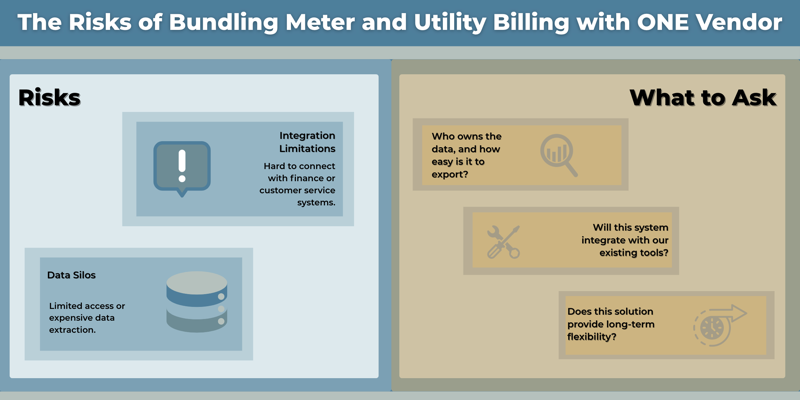Need help?
Please email us at support@munibilling.com or call us at 1-800-259-7020
Why Utility Autonomy Protects Municipalities from Vendor Lock-In
 Andy Thoman
Andy Thoman

Why Utility Autonomy Protects Municipalities from Vendor Lock-In
Vendor lock-in is a hidden risk many municipalities face when managing utility operations. At first, it may seem convenient to rely on a single vendor for both metering and billing. But over time, this dependence can limit flexibility, drive up costs, and weaken a utility’s ability to adapt to new technologies.
What Is Vendor Lock-In and Why Is It Risky?
Vendor lock-in occurs when a municipality becomes overly dependent on one provider for both metering and billing functions. Once a utility’s operations are tied to a single vendor’s technology and processes, switching to another system becomes difficult and expensive.
Key risks include:
-
Reduced bargaining power: With fewer alternatives, municipalities lose leverage in contract negotiations, often leading to higher costs.
-
Inflated expenses: Locked-in vendors may raise prices for maintenance, upgrades, or new features.
-
Limited flexibility: Integrating new technologies or services may be blocked or require steep fees.
-
Operational vulnerability: If the vendor faces outages, staffing shortages, or security issues, the municipality has little recourse.
A system that once felt convenient can quickly become a barrier to efficiency, cost control, and innovation.
1. What Does Operational Autonomy Mean?
Autonomy ensures municipalities keep control by separating metering from billing. Rather than depending on a single provider for everything, autonomy allows municipalities to choose the best option for each function.
In practice, autonomy provides:
-
Independent system selection: The ability to replace or upgrade systems separately.
-
Greater flexibility: Adoption of new technologies without being tied to proprietary systems.
-
Improved cost control: Competition between vendors helps keep pricing fair.
-
Future-proof operations: Utilities can evolve as regulations or community needs change.
By prioritizing autonomy, municipalities strengthen financial health, build resilience, encourage innovation, and protect taxpayers from unnecessary costs.

2. Flexibility with Utility Billing
Regulations, technology, and community needs are never static. A system that works today may not fit tomorrow’s requirements. Flexible billing platforms reduce risk and extend the life of technology investments.
Benefits of flexible billing include:
-
Regulatory compliance: Adapts quickly to new billing rules without costly replacements.
-
Technological integration: Connects with new tools to improve efficiency and reporting.
-
Community responsiveness: Scales to meet population growth and changing expectations.
Without flexibility, municipalities risk disruption, expensive migrations, and staff strain.
3. How Autonomy Supports Compliance
Regulations around billing transparency, data retention, and consumer protection evolve frequently. Vendor-controlled systems force municipalities to wait for vendor updates, which may not align with compliance deadlines.
Regulations update continually, from statewide privacy rules to evolving cybersecurity directives, so autonomous/loosely‑coupled systems help municipalities adapt without waiting for a single vendor’s roadmap. For example, when the California Public Utilities Commission formally adopted rules to protect the privacy and security of customer usage data from smart meters and required ongoing compliance and reporting, this is an instance when municipalities don't want to be stuck on a system that isn't able to be compliant.
Autonomous systems put compliance control back in municipal hands. For example, if new billing transparency rules are introduced, a municipality with autonomy can adopt compliant tools immediately. This reduces regulatory risk and ensures residents are billed accurately.
4. The Role of Innovation and Data Security
Metering and billing technologies are advancing rapidly, from smart meters to AI-powered billing. Municipalities locked into one vendor are limited to that vendor’s pace of development. Autonomy allows them to adopt best-in-class tools on their own timeline.
Data security is another critical issue. Municipalities often manage sensitive customer and financial data, and over-reliance on third-party vendors creates risks of misuse or restricted access. By maintaining independent systems, municipalities ensure ownership and safeguard community trust.
Many municipalities are finding themselves caught in costly traps with their software solutions according to the U.S. Government Accountability Office. Some have even been required to pay additional payments just to regain ownership of their own data after migration. These restrictive licensing practices not only drive up expenses but also limit ability to choose the best provider for their needs. And while there are federal guidelines for evaluating services, there are still no overarching requirements to address restrictive software licenses, leaving municipalities vulnerable to vendor lock-in and unexpected costs.
Best practices for secure autonomy include:
-
Local backups and archives
-
Clear contractual terms around data ownership
-
Role-based access controls
-
Encryption and compliance standards
These safeguards allow municipalities to integrate outside solutions without giving up control.
5. Risks of Bundled Metering and Billing Solutions

Bundled solutions often appear attractive because they promise convenience. However, they can create long-term challenges such as:
-
Integration limitations: Difficulty connecting with financial or customer service systems.
-
Data silos: Restricted access to data or high fees to extract information.
When evaluating bundled options, decision-makers should ask:
-
Will this system integrate with our existing tools?
-
Who owns the data, and how easy is it to export?
-
Does this solution provide long-term flexibility?
Asking these questions helps municipalities avoid costly pitfalls.
6. Building Sustainable Utility Operations
Choosing a billing system is more than a short-term technology decision. Avoiding vendor lock-in preserves choice and cost control, while flexibility ensures systems can evolve alongside regulations and community needs.
Autonomy gives municipalities leverage. With the ability to switch providers or integrate new tools, they encourage competition that leads to fairer pricing, better service quality, and improved resilience.
Final Thoughts
Bundled metering and billing solutions may seem convenient, but they often conceal risks like integration gaps, data silos, and vendor lock-in. Autonomy, on the other hand, gives municipalities control, protects community trust, and ensures long-term sustainability.
Next Steps:
Audit your current billing system. Are there signs of vendor lock-in or limitations that restrict flexibility?
Explore vendor-neutral platforms like MuniBilling that maintain autonomy while delivering powerful billing and reporting capabilities.